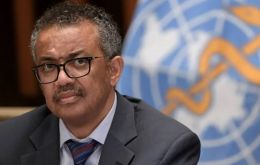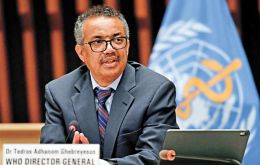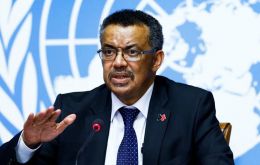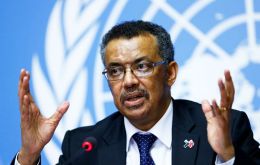MercoPress. South Atlantic News Agency
Tag: Dr Tedros Adhanom Ghebreyesus WHO Director General
-
Friday, February 7th 2025 - 08:32 UTC
Covid 19: Milei wants WHO Chief tried for human rights violations

Argentine President Javier Milei announced Thursday that he intends to hold World Health Organization (WHO) Director Tedros Adhanom Ghebreyesus accountable “for crimes against humanity” given the measures recommended and adopted during the Covid-19 pandemic. Earlier this week, the South American country left the WHO, thus following in on US President Donald Trump's steps.
-
Wednesday, August 14th 2024 - 21:31 UTC
WHO declares global public emergency due to mpox outbreak in Africa

The World Health Organization (WHO) declared Wednesday its highest global alert level given a surge in the number of cases of monkeypox in Africa and the threat of a new pandemic it poses. This time around the virus has spread rapidly through 13 countries in Africa, including regions where cases had never been reported before.
-
Monday, May 27th 2024 - 19:18 UTC
WHO Pandemic Agreement not achieved but Tedros still confident

World leaders were urged Monday to keep working toward an unprecedented agreement among nations that would give the World Health Organization (WHO) a stronger voice in fighting the next pandemic. The announcements came after negotiators failed to produce a draft of the agreement by the May 24 deadline, although talks are still ongoing and some form of pact is said to be on the table.
-
Saturday, March 18th 2023 - 09:42 UTC
WHO hopes to liken Covid-19 to seasonal flu this year

According to the World Health Organization (WHO), Covid-19 might soon be similar to seasonal flu in terms of the threat it means to human life, it was announced as the global agency hopes to further reduce its maximum alert level this year.
-
Thursday, September 22nd 2022 - 19:12 UTC
WHO chief says end of COVID-19 nearer but still to be reached

World Health Organization (WHO) Director-General Tedros Adhanom Ghebreyesus said today that the planet was “better positioned than ever” to end the COVID-19 pandemic.
-
Friday, January 1st 2021 - 22:35 UTC
WHO Director General New Year message: COVID-19 one year later

As people around the world celebrated New Year's Eve 12 months ago, a new global threat emerged. Since that moment, the COVID-19 pandemic has taken so many lives and caused massive disruption to families, societies and economies all over the world.
-
Friday, February 14th 2020 - 20:58 UTC
“Isolating cases and quarantining contacts is not going to stop COVIC-19”, infectious scientists warn

As the number of COVIC-19 coronavirus cases jumps dramatically in China, a top infectious-disease scientist warns that things could get far worse: Two-thirds of the world's population could catch it.
-
Saturday, July 28th 2018 - 08:54 UTC
WHO focuses on “Test.Treat.Hepatitis” on World Hepatitis Day

The World Health Organization (WHO) and partners are calling on countries to urgently increase hepatitis testing and treatment services in order to eliminate viral hepatitis as a public health threat by 2030.
-
Tuesday, June 19th 2018 - 06:56 UTC
WHO releases new International Classification of Diseases (ICD-11)

The World Health Organization (WHO) is releasing this Monday its new International Classification of Diseases (ICD-11). The ICD is the foundation for identifying health trends and statistics worldwide, and contains around 55 000 unique codes for injuries, diseases and causes of death. It provides a common language that allows health professionals to share health information across the globe.
-
Thursday, May 31st 2018 - 20:16 UTC
World No Tobacco Day: Tobacco and Heart Disease

Tobacco use has declined markedly since 2000, according to a new WHO report, but the reduction is insufficient to meet globally agreed targets aimed at protecting people from death and suffering from cardiovascular and other non-communicable diseases (NCDs).
